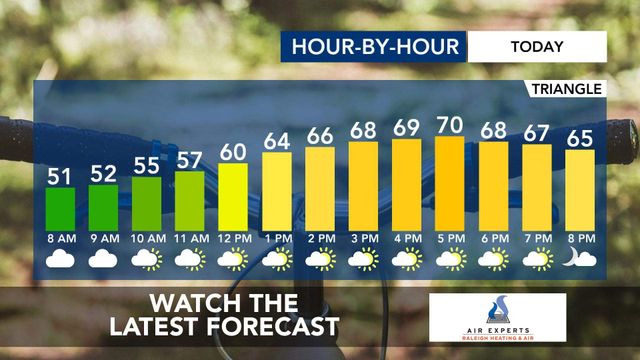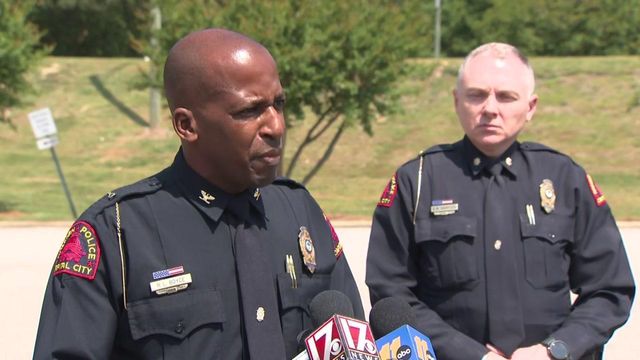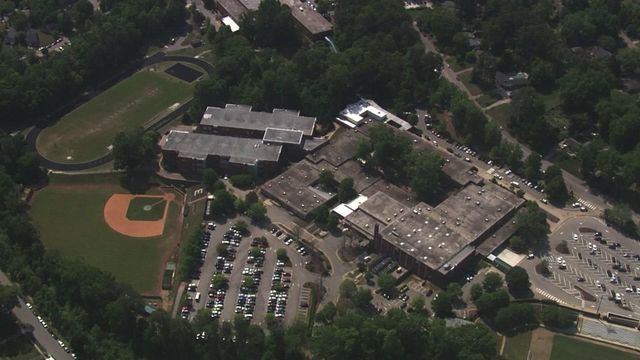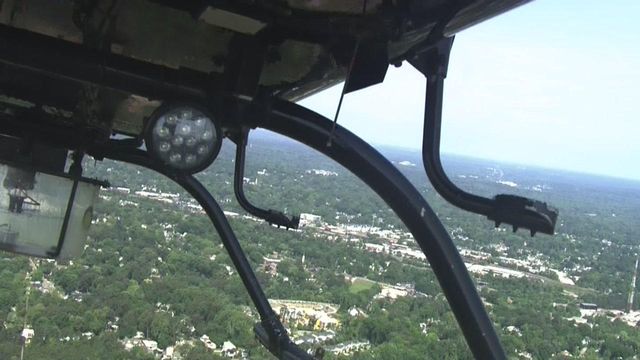How local, community partnerships strengthen policing

This article was written for our sponsor, the Triangle Regional Recruitment Partnership.
For police departments in the Triangle, community is at the core of their work. Listening to, adjusting to, and collaborating with various facets of the community, now more than ever, is crucial to departments understanding areas of need and building trust between officers and members of the community.
Many departments benefit from partnerships with local educational institutions. From Wake County to Johnston County, departments have found rich opportunities to collaborate with different sectors of the community, providing education to future and current recruits at local community colleges and shedding light on departmental practices at open forums.
In Clayton, a partnership with the county's community college plays a key role in preparing a well-trained and community-driven police force.
"We do a lot of our in-service training, and we run all of that training through the Johnston Community College. That helps the college earn credits that they use to get reimbursed from the state for the work they're performing," said Clayton's Chief of Police Blair Myhand. "We run all of our firearms training through the community college, we do driver's training through the community college, and we're getting training for free, as a police department — which, I think that everybody would agree that in these times where revenues are limited, for the community college to be able to provide training to my entire department at no cost to us is a tremendous benefit for the department. It's really a win-win situation for us and the community college as well."
For Myhand, personal and professional connections to the college have helped cement the collaboration. One of his former sergeants is now the Director of the Basic Law Enforcement Training program at Johnston Community College, and a good relationship with the associate vice president of several other programs helps keep him abreast of relevant and emerging training needs.
This strong relationship not only helps local police departments identify promising recruits right off the bat, but also helps the colleges understand what programs they can offer that would be helpful for local departments and support the organization. For example, Myhand was able to tap into professionals from the highway patrol through the community college in order to offer driver training — a course which requires a specifically qualified instructor.
While most community members wouldn't have a reason to enroll in law enforcement classes, many are still curious about what's taught and how officers apply that training in real life. At the Apex Police Department, the Community Academy serves as a link between citizens and law enforcement education. Started in 2008, the ten-week program covers everything from traffic stops to criminal investigation procedures.
"The Academy was designed to be a window into and exposure to the training that we receive when we become police officers through something called the Basic Law Enforcement Training Academy," said Deputy Chief Mitch McKinney of the Apex Police Department. "Through the different iterations of the course, we've incorporated more and more experiences that we can expose the class to and give them the opportunity to look at how we forensically work through a crisis."
As the Academy has moved forward, the department has been able to use new equipment to enhance the experience. For example, a virtual simulator purchased last year has been used to open a window into real-time decision-making and firearm training. For those involved in the Community Academy, McKinney sees it as a valuable opportunity to break down barriers in the community and bring transparency to policing practices.
In addition to the Community Academy, the Apex Police Department also participates in events like Christmas with a Cop and the Special Olympics. Another key aspect of their community involvement comes through the Faith and Blue partnership program, a national initiative that's focused on reinforcing connections between local law enforcement and the communities they serve with the help of local religious institutions.
The department hosted a virtual community forum in early October, partnering with Pastor Rodney Finch and Calvary Chapel Cary to broadcast the event on social media and YouTube. While Faith and Blue is a relatively new event for the department, McKinney hopes to see it grow and serve as a jumping-off point for interacting with other parts of the community.
"For Faith and Blue, we had local ministries come together with our command staff to basically have a forum where we talked about issues that the faith-based community had questions about. We've done this sort of thing before with our Hispanic and Latinx community with the Fiesta Christiana, so we kind of mirrored Faith and Blue after that partnership," said McKinney. "We're just trying to cast a broader net and re-communicate that we're a police department for all of our community. We want to continue to build outreach and engagement and figure out what that will look like for all community groups."
It's not just the Apex Police Department bringing the focus to community interaction. While each department has its own methods, that emphasis on community engagement is also a large part of what drives Myhand's department.
Since an individual isn't able to become a police officer until age 21 but graduates high school around age 18, there are a few gap years that make it hard for departments to stay connected with potential, high-caliber recruits. While classes at community colleges help bring added interest, Myhand's department in particular has developed a multi-year strategic plan for engagement.
Through the plan, Myhand hopes to not only foster partnerships with local schools, but also connect with the community in order to hear important feedback on what the department can improve upon.
"Last year, we went to a high school and sat down with a couple of different classes of students, and basically had an hour-and-a-half discussion about what they would like to see us as a police department focus on that was important to them. Some of the kids wanted to know about, 'What do I do if I get into a crash when I'm driving?' or, 'What do I do if I get pulled over?' or different things that were important to them," said Myhand. "I want to make sure that we're focusing our operations based on what they're experiencing now, and ways that we can improve that."
"The biggest thing that I try to do is focus on actually building real-life relationships with people, and talking to them, and figuring out what's important to them," continued Myhand. "Because ultimately we are serving the public, and I think we're not doing our job if we don't find out exactly what the public wants."
McKinney echoed a similar sentiment, emphasizing the role input from the community plays in effective policing. In the future, he hopes the department's efforts will continue to break down barriers in the community.
"As much as we would love to tell you that we know your neighborhood better than you do, that's not accurate — you know your neighborhood because it's a part of you. We're a component of keeping the community safe, but a much bigger part of that operation is the ability to communicate with people in their neighborhoods," said McKinney. "Part of our desire and our goal in participating in a diverse array of community opportunities is that we want people to know that we are very willing to engage with them and let them set the parameters for what that communication is going to look like."
"We're here 24/7, and our officers really enjoy the opportunity to practice that part of community policing," he finished. "Our police department is only successful when we build those strong relationships and partnerships and are able to have community interaction."
This article was written for our sponsor, the Triangle Regional Recruitment Partnership.











